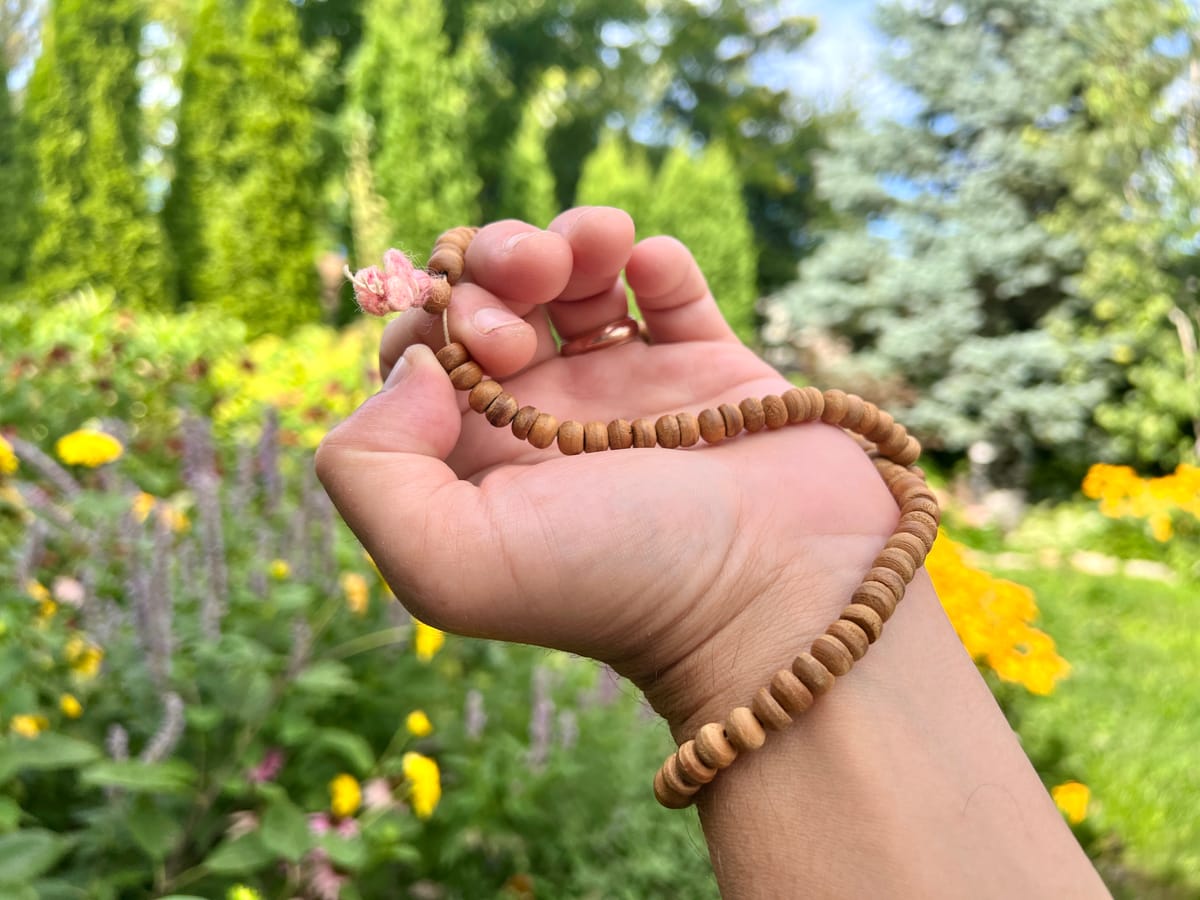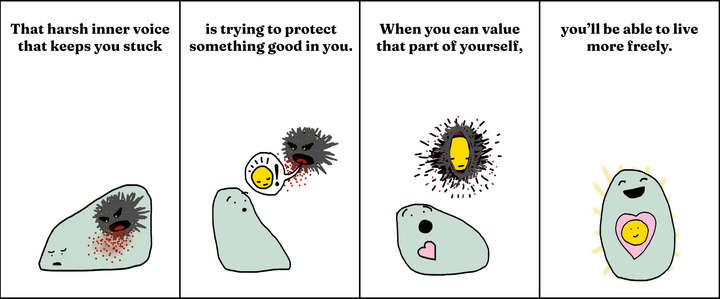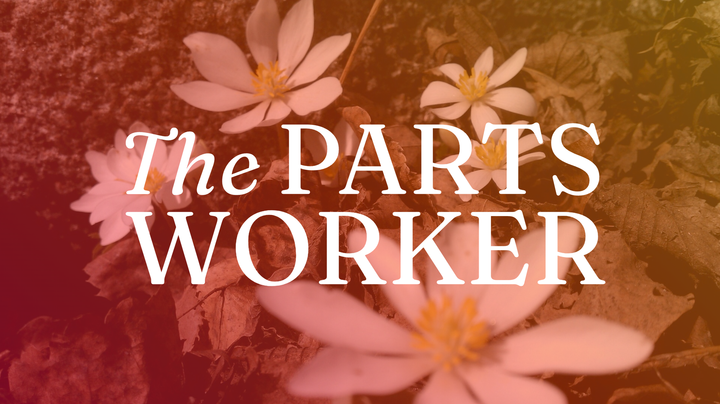Well hello again! 👋 It is lovely to be back in your inbox after all these absurdly eventful months. Since unprecedented times seem likely to continue for the foreseeable future, I’d like to offer two practical ideas about how living more plurally can help us stay sane as history whirls us along.
If you’re overwhelmed by the news, that’s not because you’re doing something wrong: it’s because, for human beings, the news is overwhelming.
Uffda, it’s been forever! I sent you my last dispatch from this Year of Living Plurally in mid-March. Five months is a long time in any ordinary year; in 2024, it’s an eternity. “Unprecedented” time, we-are-witnessing-history-being-made time, feels very different from other kinds of time, perhaps the way cat- or dog-years are said to be seven times longer than ours. How long would the bonkers eventfulness of five 2024-months have seemed to beings in other eras? Like, fifteen 1993-months, maybe? A decade to a sixteenth-century monk? To an Eocene rock, five million years?
Anyway — it’s been a lot, and it will certainly will continue to be a lot. Too much, in fact! And everybody seems to be feeling the strain, in proportion to their exposure to the violence of historical change. Trans people in the United States, for example, are under particular duress; so are American women and schoolchildren, people who live below sea level, everyone in Gaza. Even those of us who have lucked into relative safety from the worst perils of our age are deeply affected by them — and I think we are right to be.
If you are avoiding the news for your own survival, you are absolutely right to do so; I trust your system absolutely. But if you can’t avoid the news, by profession or by temperament, you are almost certainly under considerable stress right now. (Ask my phone’s “Screen Time” how I know.) So, just in case you need to hear it, I want to offer a thought I’ve been sharing with my coaching clients a lot lately:If the news of the world we live in right now makes you sad, enraged, anxious, panicky, dissociative, or otherwise emotionally overwhelmed, it should.
Your distress about the news is not a symptom of your personal trauma. It’s not something you have to get over, or work through, or resolve. It’s just your normal human response to the inhuman scale and velocity of the world we live in now. Like a city built below sea level, our existing emotional infrastructure was simply not set up to weather the accelerating crises of the Anthropocene. If you’re overwhelmed by the news, that’s not because you’re doing something wrong: it’s because, for human beings, the news is overwhelming.
So I want to offer a couple practical ways to feel a bit more comfort and ease, even in these far too interesting times, by relaxing into your own multiplicity. I have more tips, and I will write to you about them. But these are the two that I’ve been using most.
📿 Tip: It’s Okay to Pray
First as a Catholic, then as an Episcopalian, then as a member of A.A., I prayed in all kinds of ways, and none of them worked at all — so poorly, in fact, that I left first the Church, then Christianity altogether, then even the subtly Christian-flavored spirituality of the Twelve Steps. For a few years afterward, every time I caught myself praying — for me, prayer is a deeply conditioned spiritual reflex — I’d stop myself short on purpose, because (as I’d firmly remind the pious parts of my inner family) “God just doesn’t work like that, honey.”
But this Year of Living Plurally, which also happens to be a five-alarm fire of news, the prayerful members of my inner family are praying quite openly — and nobody else is stopping them. I find myself praying all the time now — often more than once a day, quite spontaneously, in response to reading or thinking about the news. I ask God to relieve suffering, to sustain an unlikely hope for more compassionate leaders, to make good prevail over evil. And I pray for these things even though there is a strong consensus among my inner family that “thinking loudly at God” (as one of us calls it) does not and cannot change God’s mind about anything.
The internal consensus, these days, is that prayer is an innocent act, a sort of semi-magical custom, as harmless as wishing on a star or birthday candles. For that reason, my 2024 prayers don’t have the desperate urgency they used to when I was a child (and believed God heard my prayers, and could have helped me, but wouldn’t, until I found just the right words). Even though we’re more relaxed about it now, we find ourselves praying all the time — and we find curious comfort in the act of praying itself. It feels good to make explicit our deeply felt desire for the world to be better in specific ways — even if only in the silence of our heart, where perhaps only we can hear. Wishes are not fishes, as everybody knows; but why not cast a wee net?
In the past, I’ve expressed my deepest wishes by engaging in vigorous and public political action — going to protests, campaigning for candidates and movements, canvassing. But that sort of work doesn’t feel like what I ought to do at present. (There’s another newsletter in that.) In anyone’s life, I now suspect, there is a time to tweet, and a time to refrain from tweeting; a time for phone-banking, and a time for silent prayer. And these two modes of action feel quite similar, honestly: speaking heartfelt words into a blank silence, always hoping for a friendly voice to answer.
In both cases, I think the mere act of calling out is an act of courage and love, worthwhile for its own sake.
Everybody and their dog Scout is hollering at you to phone-bank right now — which, if you want to, you absolutely should! (Pro tips: use wired earphones, set up a burner Google Voice account ahead of time, and do not phone-bank alone.) In this manic political season, I want to holler that you can also pray, if any part of you is so inclined — out loud or silently, formally or informally, in the prayers you learned as a child or in new rites you fangle for yourself, sincerely or ironically or both at once. Pray if you want to pray!
There are almost certainly parts of you who are concerned about the safety or advisability of prayer — you can’t really get by in modern life without such skeptical inner voices, so this is a good thing. To them you can offer this mellow riff on Pascal’s wager:
- If “praying” is just a weirdly superstitious form of self-talk or fantasy, then it’s not only harmless but meaningless — just an ephemeral shimmer of neurochemistry in some critter’s brain, as meaningless as shifting sand. If you don’t want to engage in this form of cognition, don’t; if you do, go right ahead. It doesn’t matter either way.
- Meanwhile, if divine agents might hear and understand you when you pray, then prayer could be as potent a form of practical action as any human being could take, a literal superpower! A direct line to the divine! You’d be bonkers not to give it at least a whirl. It’s even easier than calling your Congressman, and potentially far more effective.
My inner family and I suspect there are parts of most people, even extremely modern adults, who stubbornly believe (2) to be true, even while the overwhelming consensus of their inner voices insists on (1). When unacknowledged or driven underground, the pious parts of people contrive to take them to casinos, 4chan chatrooms, and other dangerous places built to encourage magical beliefs. (Like the bathhouses and leather bars of my youth, now that I think of it.)
If, by contrast, you let the pious parts of you make their case in the public of your inner community, you might get to pray for what you really want: for the world to be better in specific ways, for particular sufferings to end, for hoped-for acts of kindness and of love.
If praying works, it’s powerful; and even if it doesn’t, it still gives voice to your hopes, which is worthwhile for its own sake. That is how my inner family and I are thinking about prayer in this bewildering time, and we encourage you and yours to try the same approach. Why not?
🎭 Tip: Your Ambivalence is Healthy and Good
The thing that makes prayer tricky, for most modern people, is that parts of us definitely believe it works (because we are human and wired for faith), while other parts of us insist that it can’t possibly work, and that we’re literally crazy if we think it does (because we are also modern and “believe in science”). That ambivalence, as uncomfortable as it can be, is in fact a great blessing, and much to be encouraged.
Ambivalence is good! In our minds as in our external communities, vigorous dissent is democratic; being consistently “of one mind” is a warning sign of inner autocracy. So it’s a very good thing when you react to a shattering historical event in more than one way at the same time. One long-ago day last month, to take a purely hypothetical example,
- one part of you might might have thought fervently, “Dammit, I wish he’d have had better aim,”
- while another part of you sighed, “Thank God he missed, or we’d be in a civil war,”
- and still another part of you whispered tearfully, “It is scary to see that man bleeding from his ear! Why would someone want to hurt him like that? Please let him be okay!”
This kind of ambivalence — purely hypothetical, mind you, and just by way of example — is not a sign that you’re crazy or murderous or cynical or fascist, or any other pathology. Your ambivalence shows that you’re human. Welcome to your own plurality! It’s a trip!
If there’s one thing I know for certain, it’s that accepting and even valuing the diversity of perspectives within yourself — not choosing sides, not censoring any thought or wish, not shaming any part of who you are for thinking any thought — will make you much more comfortable as you navigate the complexities of human life. And as history complicates our lives faster and more completely than we could possibly predict, our plurality can save us — not just from emotional discomfort, but from the harmful seduction of enforced consensus. White supremacy, ethno-nationalism, nativism — these totalitarian ideologies attract the parts of people who are frightened by the mere fact of diversity. Honoring our own internal diversity is the most potent anti-fascist action we can take.
So lean into your bonkers ambivalence, friends! I promise you’ll feel better if you do.
Right now, some of my internal family are hooting with a giddy childlike optimism we haven’t felt since ’08; other parts of me are ringing bells to warn that Harris and Walz are just the latest stooges of neoliberal capitalism; other members of my inner community are focused exclusively on the suffering in Gaza; and still others are simply overjoyed by the beauty of my husband’s garden and the infinite variety of critters who visit it at every hour of every day. All these parts of me are welcome; they all learn from each other.
That is the substance of this plural tip: we are all diverse, all the way down. Nobody is just one thing; to be human is to be multiple. And that knowledge, all by itself, can help you stay sane in these unprecedented times.





